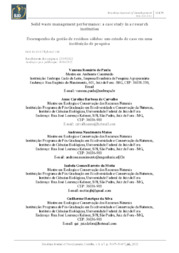Solid waste management performance: a case study in a research institution.
Solid waste management performance: a case study in a research institution.
Author(s): PAULA, V. R. de; CARVALHO, A. C. B. de; MATOS, A. N.; MOTTA, I. G. B. da; SILVA, G. H. da; SANTANA, L. A. R.; OTENIO, M. H.
Summary: ABSTRACT - Waste is a environmental problem. Waste generation increases exponentially, and the management to minimize environmental impacts. The launch of the 17 (SDGs), by the U.N., aimed to mobilize to implement public policies based on the pillars of sustainability. At (studied company) routines of research laboratorial activities, farms and administrative areas generate waste. We evaluated the waste management at the (studied company) research institution. We applied methodologies for a comprehensive view. Gravimetric method for characterization of waste in each category. Monitoring of waste generator points resulted in the diagnosis of waste separation. The methodology of the Discourse of the Collective Subject was used to understand the perception of employees. We development the SWOT matrix, to identify the factors that affect the waste management. We understand and rank the strengths, weaknesses, opportunities and threats, and they can be used for the development of management. RESUMO - O lixo é um problema ambiental. A geração de resíduos aumenta exponencialmente, e a gestão minimiza os impactos ambientais. O lançamento dos 17 (ODS), pela ONU, teve como objetivo mobilizar para a implementação de políticas públicas baseadas nos pilares da sustentabilidade. Nas rotinas de atividades laboratoriais de pesquisa, fazendas e áreas administrativas geram resíduos (empresa estudada). Avaliou-se a gestão de resíduos em uma instituição de pesquisa. Aplicou-se metodologias para uma visão abrangente. Método gravimétrico para caracterização de resíduos em cada categoria. O monitoramento dos pontos geradores de resíduos resultou no diagnóstico da separação de resíduos. A metodologia do Discurso do Sujeito Coletivo (DSC) foi utilizada para compreender a percepção dos funcionários. Desenvolveu-se uma matriz SWOT, para identificar os fatores que afetam a gestão de resíduos. Foram entendidos e classificados os pontos fortes, fracos, oportunidades e ameaças, e eles podem ser usados para o desenvolvimento da gestão.
Publication year: 2022
Types of publication: Journal article
Unit: Embrapa Dairy Cattle
Keywords: Gestão ambiental, Matriz SWOT, Representação social, Resíduo Solido
Observation
Some of Embrapa's publications are published as ePub files. To read them, use or download one of the following free software options to your computer or mobile device. Android: Google Play Books; IOS: iBooks; Windows and Linux: Calibre.
Access other publications
Access the Agricultural Research Database (BDPA) to consult Embrapa's full library collection and records.
Visit Embrapa Bookstore to purchase books and other publications sold by Embrapa.

